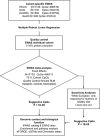A meta-analysis of epigenome-wide association studies of ultra-processed food consumption with DNA methylation in European children
- PMID: 39773758
- PMCID: PMC11706074
- DOI: 10.1186/s13148-024-01782-z
A meta-analysis of epigenome-wide association studies of ultra-processed food consumption with DNA methylation in European children
Abstract
Background/objective: There is limited knowledge on how diet affects the epigenome of children. Ultra-processed food (UPF) consumption is emerging as an important factor impacting health, but mechanisms need to be uncovered. We therefore aimed to assess the association between UPF consumption and DNA methylation in children.
Methods: We conducted a meta-analysis of epigenome-wide association studies (EWAS) from a total of 3152 children aged 5-11 years from four European studies (HELIX, Generation XXI, ALSPAC, and Generation R). UPF consumption was defined applying the Nova food classification system (group 4), and DNA methylation was measured in blood with Illumina Infinium Methylation arrays. Associations were estimated within each cohort using robust linear regression models, adjusting for relevant covariates, followed by a meta-analysis of the resulting EWAS estimates.
Results: Although no CpG was significant at FDR level, we found suggestive associations (p-value < 10-5) between UPF consumption and methylation at seven CpG sites. Three of them, cg00339913 (PHYHIP), cg03041696 (intergenic), and cg03999434 (intergenic), were negatively associated, whereas the other four, cg14665028 (NHEJ1), cg18968409 (intergenic), cg24730307 (intergenic), and cg09709951 (ATF7), were positively associated with UPF intake. These CpGs have been previously associated with health outcomes such as carcinomas, and the related genes are mainly involved in pathways related to thyroid hormones and liver function.
Conclusion: We only found suggestive changes in methylation at 7 CpGs associated with UPF intake in a large EWAS among children: although this shows a potential impact of UPF intake on DNAm, this might not be a key mechanism underlying the health effects of UPFs in children. There is a need for more detailed dietary assessment in children studies and of intervention studies to assess potential epigenetic changes linked to a reduction in UPF in the diet.
Keywords: Children; DNA methylation; Epigenome-wide association study (EWAS); Nutrition; Ultra-processed food (UPF).
© 2024. The Author(s).
Conflict of interest statement
Declarations. Ethics approval and consent to participate: Detailed information about the ethical approvals and the consent procedures for each cohort study can be found in the supplemental materials S1 accompanying this manuscript. Consent for publication: Not applicable. Competing interests: The authors declare no competing interests.
References
-
- Onita BM, Azeredo CM, Jaime PC, Levy RB, Rauber F. Eating context and its association with ultra-processed food consumption by British children. Appetite. 2020;2021(157): 105007. - PubMed
Publication types
MeSH terms
Grants and funding
- RYC2020-029599/MCIN (Spanish Ministry of Science and Innovation) and EI FSE "Invest in your future
- 2022 INV-1 00046/European Union - NextGenerationEU
- 101059245/European Union's Horizon Europe research
- MR/S03532X/1/UKRI Future Leaders Fellowship
- MR/S03532X/1/MRC_/Medical Research Council/United Kingdom
LinkOut - more resources
Full Text Sources


